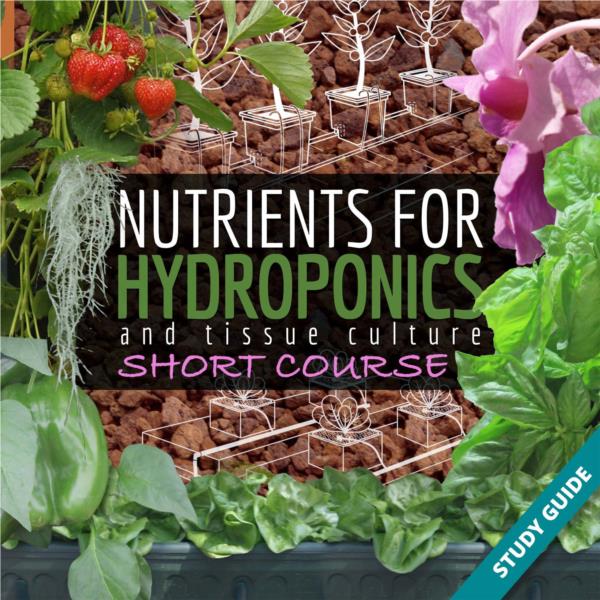Home > Short Courses
Nutrients for Hydroponics for Tissue Culture- Short Course
Sneak Peek
Learn to use nutrients for hydroponics, and tissue culture
While this course concentrates more on hydroponic culture than tissue culture; both require frequently overlapping knowledge. Both ultimately are doing the same thing - growing plants without soil in an inert media.
Growing plants hydroponically is a unique way to grow more plants in smaller spaces and without any soil. As plants need nutrients, when growing planting hydroponically, you will need to add nutrients. This course is a complete introduction to helping you learn how to ensure that your plants grown hydroponically have the right nutrients. Knowing what to add and the right quantities is covered in this short course.
What's Inside the Course?
LESSON 1 INTRODUCTION
Artificial Growing
Tissue Culture
Hydroponics
How Plants Uptake Nutrients
How Plants Absorb and Use Nutrients in Hydroponics
Hydroponics Techniques
Review what you have been learning
LESSON 2 PRE-PACKAGED NUTRIENTS
Using Solid Nutrients
Solutions and Precipitates
Why Twin-Pack Chemicals?
Why Single-Pack Liquid Solutions?
Organic Solutions
Review what you have been learning
LESSON 3 CHEMICAL COMPONENTS
Types of Chemicals
Electrical Conductivity
The Role of pH in Hydroponics
What are Solutions?
What Does a Hydroponic Nutrient Look Like?
Writing Chemical Names
Calculating the Amount of Nutrient in a Chemical
Mixing Nutrients
Hydroponic Fertiliser details
Lesson 3 additional reading
Review what you have been learning
LESSON 4 OTHER ADDITIVES
Introduction
Allowable Additives for Hydroponic Nutrient Solutions
Beneficial Trace Elements as Hydroponic Additives
Bio-stimulants as Hydroponic Additives
Foliar Nutrition and Foliar sprays
Review what you have been learning
LESSON 5 CREATING HYDROPONIC NUTRIENTS
Introduction to Basic Mixes
Process of Making and Mixing Nutrients from Fertiliser Salts
Example Solutions
Nutrient Solution Formulation
Hydroponic Nutrient Levels
Nutrient Ratios
Assessing a Nutrient Formulation
Suggestions for Beginners
Review what you have been learning
LESSON 6 ORGANIC HYDROPONIC NUTRIENTS
Brief History
Issues with Organics
Types of Organic Systems
Allowable Nutrient Sources and Products for Organic Production
Making Organic Nutrient Solutions Onsite
EC and pH Control in Organic Hydroponics
Problems with Organic Nutrients
Lesson 6 additional reading
Review what you have been learning
LESSON 7 TISSUE CULTURE NUTRIENTS
Hydroponics vs. Tissue Culture
Nutrient Supply in Tissue Culture
A Tissue Culture Medium
Other Additives in Tissue Culture and Hydroponics
Organic Compounds
Review what you have been learning
LESSON 8 MANAGING CONTAMINANTS
Water Quality
Disinfection Systems
Preventing Chemical Contaminants from Leaking into the Broader Environment
Review what you have been learning
LESSON 9 TESTING SOLUTIONS
Important Tests in Hydroponics
Water Quality Tests
Water quality test results and interpretation
Nutrient Balance Testing: Solution Analysis
Plant Testing: Foliar Mineral Levels
pH Tests for Hydroponics
EC Testing
Automatic EC and pH testing and control
Review what you have been learning
LESSON 10 NUTRITIONAL DISORDERS
Nutrition Management
Diagnosing Nutritional Stress
Nutritional Deficiencies
Macronutrients: NPK Deficiencies and Toxicities
Other Common Deficiencies and Toxicities
Micronutrients
What are the Most Common Symptoms?
Key to Detecting Deficiencies and Toxicities
LESSON 11 NUTRIENT SOLUTION AND PRODUCE NUTRITION
Examples of Nutrient Solution Manipulation and Produce Nutrition
Review what you have been learning
Final Assessment
How does this course work?
You can enrol at any time.
Once you have paid for the course, you will be able to start straight away.
Study when and where you like. Work through at your own pace.
You can download your study-guide to your smart phone, tablet or laptop to read offline.
There are automated self-assessment tests you can complete at the end of each lesson. You can attempt these as many times as you wish and each time, upon completion, you can see your results. You will need internet access to complete the self assessment tests.
At the end of the course, you are presented with a large assessment which can be attempted online, anywhere, anytime. If you achieve a 60% pass in the exam; you immediately receive a downloadable certificate of completion with your name on it. If you do not achieve a 60% pass rate, you can contact us to re-sit your exam.
Contact us at anytime if you have any issues with the course.
Write a Review
Please ensure you are logged in to write a review.
Nutrients for Hydroponics for Tissue Culture- Short Course

£100.00
In stock